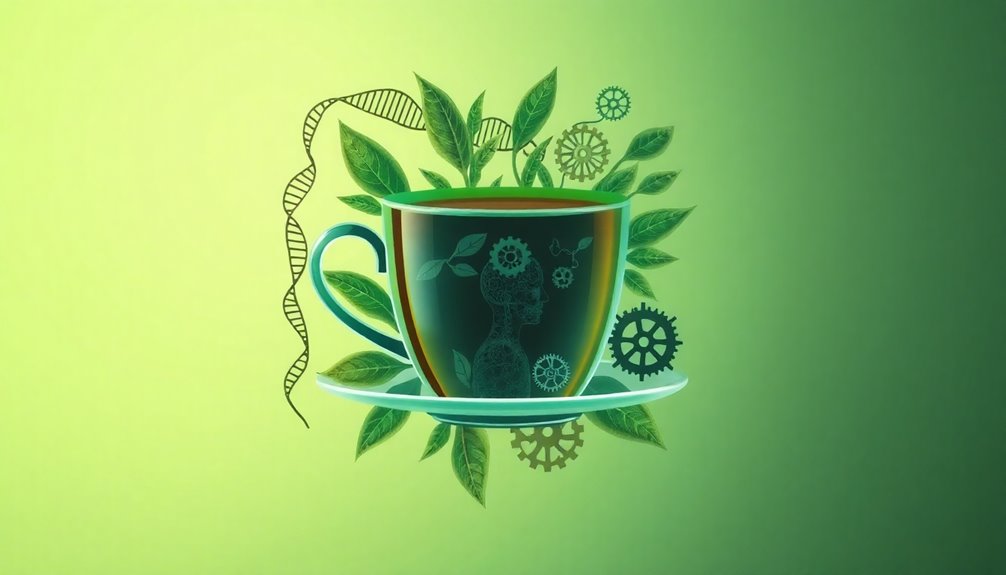Yes, tea can give your metabolism a little boost! Green tea, for instance, has special ingredients called catechins that can help you burn more calories. Drinking it can increase calorie burning by about 3-4%! However, the effects can vary since everyone's body is different, and drinking 6-7 cups might be needed for the best results—though that's a lot for some people! Plus, tea is packed with antioxidants, which are great for your health. So, sipping on sweet tea can help your body in more ways than one! Stick around to discover more fun benefits!
Key Takeaways
- Green tea can slightly boost metabolism and enhance fat burning due to catechins like EGCG, increasing calorie burning by 3-4%.
- Individual responses to green tea vary significantly based on genetics, body composition, and lifestyle, influencing its effectiveness on metabolism.
- Regular tea consumption provides antioxidants that support metabolic health and reduce oxidative stress, potentially lowering chronic disease risks.
- Research shows mixed results on weight loss, with modest averages of 1-3 kg over 12 weeks, highlighting the need for larger studies.
- Caffeine in green tea may enhance energy expenditure and fat loss effects when combined with catechins, benefiting overall metabolic health.
Introduction

When it comes to metabolism, many people turn to green tea, hoping it'll rev up their weight loss journey. You might've heard that sipping on this refreshing drink can help you burn more calories. Well, there's some truth to that!
Studies show that green tea can slightly increase your metabolism and help with fat burning. The magic comes from special compounds called catechins, especially one called EGCG. These little heroes can help your body create heat, a process known as thermogenesis, which can lead to burning more fat.
However, before you drink too much green tea, it's important to know that the effects might be pretty small and only last for a short time. Some research, like a meta-analysis by Cochrane Review, found that regular green tea consumption doesn't really change metabolism much, especially for normal-weight folks.
To see more noticeable changes, you'd need to drink about 6 to 7 cups a day, and that might be a bit too much for most people. So, while green tea can offer some benefits, it's best to keep your expectations in check when it comes to weight loss! Additionally, incorporating herbal teas into your routine may provide supportive benefits for overall well-being.
Tea's Antioxidant Properties Explained

Although many people enjoy tea for its flavor, its antioxidant properties are what truly set it apart. Tea, especially green tea, is packed with antioxidants like catechins, which help fight off harmful free radicals in your body. One standout catechin is called epigallocatechin gallate (EGCG), and it plays a big role in reducing oxidative stress. This is great news for your metabolic health! Additionally, studies suggest that coffee's health benefits may also support metabolism through its own unique compounds.
Drinking tea regularly can boost your body's antioxidant levels, which may support your cardiovascular health. Plus, the flavonoids found in tea have anti-inflammatory properties, helping your body respond better to various challenges. Additionally, many herbal teas like chamomile offer unique benefits that can complement the effects of traditional teas.
If you're looking to manage your weight, tea may lend a hand, as these antioxidants can also positively impact cholesterol levels.
Metabolism Boost Varies by Individual

While the antioxidant properties of tea contribute to its health benefits, the impact on metabolism isn't the same for everyone. You might notice that some people have a faster metabolic rate after drinking green tea, while others don't feel much of a change. This difference is all about individual responses!
When you enjoy green tea, the calorie burning effects can vary. Some studies show that regular green tea consumption doesn't always help with weight maintenance or boost your resting metabolic rate significantly. Isn't that interesting?
It seems that how much tea you drink matters too! Some research suggests you may need to consume higher doses to see measurable benefits.
Your body composition and lifestyle habits also play a role in how tea affects you. Factors like genetics add to the variability, making it clear that there's no one-size-fits-all approach.
Genetic Factors Influence Metabolism

Genetic factors significantly shape how your body processes energy and burns calories, making metabolism a deeply personal experience. Each of us is unique, and our genes can influence how we gain weight or how efficiently we burn it.
For instance, some people have genes that make them more likely to develop metabolic syndrome or insulin resistance, which can affect energy expenditure. Understanding the role of narcissistic tendencies may also help in recognizing behavioral patterns that could influence health decisions. Additionally, certain genetic variations can impact ASL fluency, which highlights the importance of tailoring communication methods to individual needs. Proper nutrition is essential for overall health and can support metabolic processes by providing the necessary nutrients for energy production.
If you enjoy sipping on green tea extracts from the Camellia sinensis plant, you might wonder if it can boost metabolism and help with fat oxidation. While it can aid some, your genetic makeup plays a big role in how effective it's for you.
Studies show that variations in genes like FTO can relate to body mass index and obesity risk.
Understanding these genetic factors can be exciting! It means you can tailor your diet and exercise plans to fit your body's needs better. Additionally, developing cultural intelligence can enhance your understanding of how different cultures approach health and wellness practices.
So, whether you're trying to lose weight or just maintain a healthy lifestyle, knowing your genetic background can help you make smarter choices.
Conflicting Research Findings

Amidst the growing interest in green tea's potential benefits for metabolism, research findings paint a mixed picture. Some studies suggest that green tea can boost your metabolism by 3-4% and help with fat burning. That sounds great, right?
However, other research shows that the overall weight loss effects from green tea are often tiny and not very important. For example, a study by Rick Hursel found a slight increase in metabolism from green tea, but this effect is usually short-lived and can differ from person to person.
The Cochrane Review did a big analysis and found no significant impact on weight maintenance or resting metabolic rate in normal-weight people. This raises doubts about green tea's long-term benefits.
Animal studies have shown that green tea extracts can improve fat metabolism, but similar human studies haven't always shown the same results. You might also hear conflicting findings about appetite suppression when drinking green tea, making it tricky to understand its real impact on weight management and metabolic health.
Practical Applications

How can you make the most of green tea in your daily routine? Start by swapping out high-calorie drinks for green tea. This simple change can help you cut down your daily caloric intake by nearly 300 calories!
If you drink around four cups of green tea each day, studies show it can help with body weight and waist size. For those with Type 2 diabetes, it might even lower blood pressure. Additionally, the ideal steeping time for green tea is 2-3 minutes to ensure maximum flavor and benefits. To enhance your morning routine, consider pairing your tea with a low carb high protein breakfast to fuel your metabolism. Establishing a net worth threshold for financial security can also motivate healthier lifestyle choices.
To really boost your metabolism, combine green tea with regular exercise. Research suggests this combination can enhance fat metabolism and improve your overall health. Additionally, incorporating mindfulness practices while enjoying your tea can further enhance the experience and promote relaxation.
If you're feeling ambitious, try drinking six to seven cups of green tea daily, as some studies indicate this might be necessary for weight loss benefits.
Frequently Asked Questions
Does Drinking Tea Boost Metabolism?
Drinking tea can slightly boost your metabolism. Regular consumption, especially of green tea, may enhance calorie burning and fat oxidation, but the overall impact on weight loss is minimal. Enjoy it as part of a healthy lifestyle!
What Is Scientifically Proven to Boost Metabolism?
To boost your metabolism, focus on regular exercise, strength training, and a balanced diet. Incorporating caffeine and green tea can help slightly, but sustainable changes in lifestyle yield the best results for metabolic improvement.
What Is the Tea Trick to Lose Weight?
To lose weight, try swapping high-calorie drinks for green or oolong tea. These teas can help reduce calorie intake and slightly boost metabolism, making it easier for you to manage your weight effectively.
What Does Science Say About Tea?
Science shows tea, especially green tea, offers antioxidants and potential health benefits. While it might slightly enhance fat oxidation, its effects on metabolism and significant weight loss aren't as substantial as often claimed.
Conclusion
In conclusion, sipping tea might give your metabolism a little boost, but it can be different for everyone! Some people feel the effects more than others, and that's totally okay. Remember, tea is also packed with antioxidants that are great for your health. So, whether you enjoy it hot or iced, it's a yummy way to stay healthy. So go ahead, brew a cup, and enjoy the warmth while knowing you're doing something good for your body!










